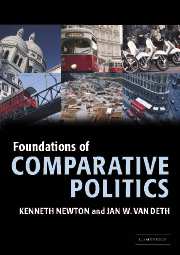Book contents
- Frontmatter
- Contents
- Acknowledgements
- List of briefings
- List of fact files
- List of controversies
- List of tables
- List of figures
- List of abbreviations and acronyms
- Key terms and concepts
- PART I The state: origins and development
- PART II The polity: structures and institutions
- PART III Citizens, elites and interest mediation
- PART IV Policies and performance
- 13 Political ideologies: conservatism, liberalism, Christian democracy and socialism
- 14 Decision making
- 15 Defence and security
- 16 Welfare
- 17 The future of the democratic state
- Glossary of key terms
- Index of names
- Index of subjects
13 - Political ideologies: conservatism, liberalism, Christian democracy and socialism
- Frontmatter
- Contents
- Acknowledgements
- List of briefings
- List of fact files
- List of controversies
- List of tables
- List of figures
- List of abbreviations and acronyms
- Key terms and concepts
- PART I The state: origins and development
- PART II The polity: structures and institutions
- PART III Citizens, elites and interest mediation
- PART IV Policies and performance
- 13 Political ideologies: conservatism, liberalism, Christian democracy and socialism
- 14 Decision making
- 15 Defence and security
- 16 Welfare
- 17 The future of the democratic state
- Glossary of key terms
- Index of names
- Index of subjects
Summary
Politics are confusing. A casual look at the daily news shows a great profusion of fast-moving events, with many conflicting and incompatible interpretations of them. How can we ever make sense of such a bewildering and incomprehensible business? The answer lies in how we organise our ideas, preconceptions and assumptions about politics. We develop a framework of ideas known as an ideology, which helps us to understand and interpret politics. This system of ideas, values and assumptions enables us to fit events into a pattern that we can understand.
Ideologies are about more than understanding, however. If politics are a struggle for power, then ideologies are part of the struggle. Party politicians in democracies know that they must win the tacit support, if not the ‘hearts and minds’ of most of their citizens if they are to continue in power. Ideologies are the tools – perhaps even some of the most important tools – by which they do this because ideologies are built around the basic interests of the most important groups in society.
Because people have contrasting interests and ideas, and because they see politics in radically different ways, there are naturally different ideological world views, including liberalism, conservatism, anarchism, Marxism, Maoism, socialism, Christian democracy, social democracy, fascism, nazism, and libertarianism, among others. Fortunately, there are only four main ideologies to be found in democracies, which helps to simplify the life of comparative political scientists to a great extent. These are conservatism, liberalism, Christian democracy and socialism/social democracy.
- Type
- Chapter
- Information
- Foundations of Comparative Politics , pp. 241 - 262Publisher: Cambridge University PressPrint publication year: 2005

